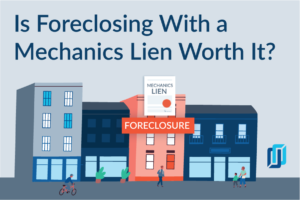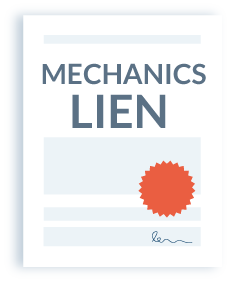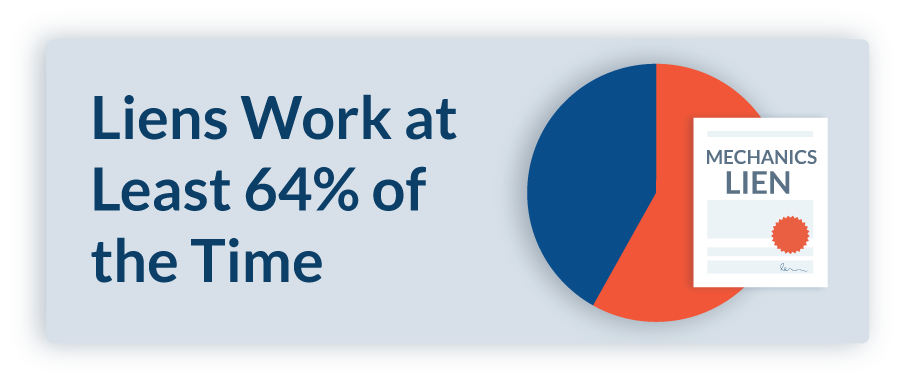
When construction businesses aren’t paid on time for their work or materials, they can file a mechanics lien on the property. But that lien doesn’t live forever — it has an expiration date. If a contractor or supplier still isn’t paid after filing a lien, they may end up facing a decision: Should we enforce the lien, and send it to foreclosure? Because foreclosing on a mechanics lien requires a lawsuit, even the thought of filing a lien to begin with can feel like a daunting task. Fortunately, it’s not a question that they need to ask very often.
Needing to foreclose on a lien is rare
Every state has mechanics lien laws that set certain deadlines for sending notices, filing a lien, and foreclosing on the lien. But facing down the foreclosure deadline is not a common occurrence, because of a powerful secret about mechanics lien claims: They very rarely result in a lawsuit where the property is put up for auction and sold.
You can draw one of two conclusions from this statement. Either foreclosure doesn’t happen because liens are successful at getting claimants paid, or the expensive and complex nature of foreclosure discourages lien claimants from taking foreclosure action. So, which is it?
We conducted a survey of mechanics lien filings from 2011 and found that more than 64% of lien claims get paid within three months, without any additional legal or collection efforts. The liens, in other words, worked by themselves to solicit payment.
100 companies are owed money and are at a dead end with collections. They all file liens. 64 of them get paid without any additional efforts. Magic. The remaining 36% are still likely to get paid, but payment may take a little longer or require a bit more legal elbow grease.
In almost every circumstance (the 64% paid immediately and the 36% that take a little longer), the actual foreclosure of the property is a non-factor. Mechanics liens have a number of effects that are unrelated to the seizure and sale of the property. Just take a look at all the ways a mechanics lien helps contractors get paid, and you’ll find 15 reasons that have nothing to do with foreclosure.
Accordingly, foreclosures don’t happen often precisely because mechanics liens are successful at getting claimants paid that the claims never get as far as a foreclosure process.
But in rare cases, enforcing a mechanics lien is the last tool left in a contractor’s payment toolbox. If you do find yourself staring down a lien foreclosure lawsuit, how do you know if it’s worth the time, effort, and money?
When Foreclosing on a Lien is Required, It’s Usually Worth It
Foreclosure with a mechanics lien may be rare, but it still happens. So, is it worth it? Is it worth the time and money required to get to foreclosure? This is a difficult question to answer.
Factors to Consider
Generally speaking, deciding whether it’s worth it to proceed with a legal foreclosure will depend on two main factors.
1. The Value Of The Claim
Who wants to spend $25,000.00 litigating a $750 debt? The value of your mechanics lien claim is going to have obvious importance in answering the question of whether lien foreclosure is worth it. The lower the claim amount, the more important it is to consider whether you’re able to obtain attorney’s fees and interest if you do successfully enforce your lien claim.
2. The Equity In The Property
While a lien foreclosure action may be worth it even if the property lacks equity (entirely different topic), whether the property has any unencumbered value is still very, very important. Who wants to spend $25,000 foreclosing on property only to recover nothing? If the foreclosure action is worth it after considering #1, you should move onto #2, which questions whether there’s any gold at the end of the rainbow.
How to Foreclose on a Mechanics Lien
Foreclosing on a mechanics lien involves filing a lawsuit against the property owner in civil court. If you’ve decided to move forward with a lien foreclosure suit, you’ll want to first consult with a good attorney. Find the top construction lawyers in your area in the Levelset Community.
If successful, your lien claim will result in a judgment lien.
Conclusion

There is, of course, more to consider than the two factors above when deciding whether or not foreclosure with a mechanics lien is worthwhile.
Nevertheless, even if you would be unlikely to foreclose, the numbers show that filing a mechanics lien may still be worth it. (Levelset’s survey indicates that 64% of lien claims are paid within three months, without the addition of any legal, collections, or foreclosure action).
Additionally, similar to the way that foreclosing with a lien is separate from filing a lien, the legal foreclosure and sale of a property is distinct from the initial action to foreclose using a lien. Reaching the point of foreclosure usually involves a fair amount of legal work (and expenses).
The initial action to enforce a lien, though it usually requires a lawyer, may help you get paid without reaching the point of foreclosure (much in the same way a lien itself will). Taking that initial action will keep your claim alive and increase pressure on parties to make payment.
